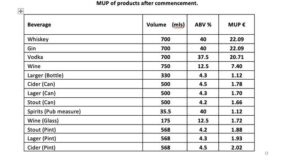Minimum Unit Pricing in Ireland: Its meaning and implications

Minimum Unit Pricing (MUP) refers to a floor price – the minimum cost at which a product can legally be sold – targeting cheap alcohol. Ireland is looking at implementing this new price minimum as early as January 2022, as it has already been passed into legislation. What exactly does it entail, and how is it supposed to affect alcohol consumption in Ireland? More specifically, what could it mean for you?
What is Minimum Unit Pricing exactly?
Minimum Unit Pricing will entail the implementation of a minimum price per unit (gram) of alcohol in any drink, under which it cannot legally be sold. This minimum price will be 10 cents per gram of alcohol, with a standard drink typically considered to have 10 grams of pure alcohol – examples include a glass of wine or half a can of 4.5% beer. We’re not used to thinking of alcohol in terms of grams per millilitres, but there is a way to calculate the impact of MUP on the price of your favourite drinks.
To do so, you must multiply the volume in millilitres by the percentage of alcohol (ABV) by the density (0.789). Then, you divide this result by 100 to obtain the gram of alcohol per millilitre content, and you multiply it by 10 to get the new minimum price under MUP.
So, for example:
- A 500 ml can of beer at 4.5% ABV:
- 500ml x 4.5 ABV x 0.789 = 1775.25
- 1775.25/100 = 17.75
- 17.75 x 0.1 = 1.77
The minimum price at which a 500 millilitres can of 4.5% beer can be sold will be approximately 1.77€.
- A 750 ml bottle of wine at 12.5% ABV:
- 750ml x 12.5 ABV x 0.789= 7396.86
- 7396.86/100= 73.97
- 73.97 x 0.1= 7.397
The minimum price at which a 750ml bottle of wine at 12.5% ABV can be sold under MUP will be approximately 7.40€.
According to Frank Feighan T.D., MUP will only impact cheap alcohol sold in off-licences, rather than affect alcohol prices in on-licence establishments such as pubs and restaurants, as alcohol is sold at much higher rates in the on-licence trade than it is in supermarkets and other similar businesses. Feighan also published a list of the new estimated prices of alcoholic beverages once MUP is implemented in the State.

Why is MUP being implemented?
According to Alcohol Ireland, MUP will target harmful drinking habits among vulnerable consumer groups. The heaviest drinkers in Ireland supply themselves in off-licences rather than on-licences and tend to consume cheaper alcohol. Since as much as 75% of alcohol consumption in the state occurs in binge-drinking sessions and about 1.3 million are considered to be “harmful drinkers”, the new minimum prices will certainly affect the habits of those who drink the most, such as young people and vulnerable communities. This in turn is expected to reduce the rates of alcohol-related deaths and violence, especially in areas where chronic heavy-drinking has had harmful consequences.
Does it work? Who will be most affected?
Other countries have already implemented MUP, such as Scotland and certain parts of Canada. Both reported a net decrease in alcohol consumption per household. However, it seems that those who will bear the brunt of the new measures will be those living on lower incomes, as this was the case in countries that have previously implemented MUP. Indeed, drinkers in this group are most likely to buy cheaper alcohol. However, estimates suggest that, as there is less alcohol consumption in lower-income communities, the measure will effectively target mainly those who drink excessively though living under the poverty threshold. It is also expected to have positive effects on existing health-inequalities as well as alcohol-related offences.
In conclusion, Minimum Unit Pricing will have both good and bad consequences. As it is expected to have few if any effects on on-licences, it could even bolster pub sales after the difficult times the hospitality sector has experienced in the pandemic. While it will disproportionately affect those from lower incomes and younger people (which is the aim of the measure), it will have a generally positive effect on Irish society by reducing alcohol-related harm. However, it is important to keep in mind that Ireland already is one of the most expensive places to buy alcohol in Europe and that there is a great chance that people will continue to buy just as much as they used to pre-MUP. They will just spend more money with the new measures. Additionally, there are no plans for a similar unit pricing in the North yet , meaning that there is a real risk of alcohol being purchased across the border and thus negating some of the MUP’s effects. The risks of a black market developing are increased too.
What are your thoughts on MUP? Let us know! Do you believe it will impact your alcohol consumption habits?